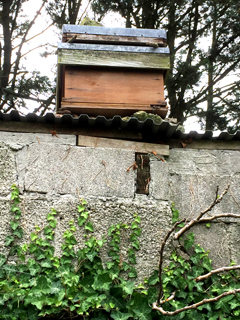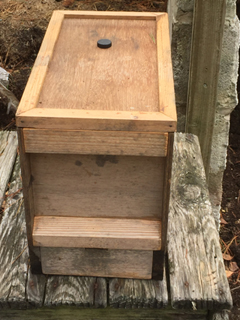 Last month I said that, because I was away, I was dubious about whether I would have any bees left by the time I returned home (joking really!). I am pleased to report that I still have bees! However, I also found a swarm had occupied my bait hive that is in one of the trees in my apiary and though I hadn’t lost the swarm it meant a colony was reduced in size and had lost most of its honey.
Last month I said that, because I was away, I was dubious about whether I would have any bees left by the time I returned home (joking really!). I am pleased to report that I still have bees! However, I also found a swarm had occupied my bait hive that is in one of the trees in my apiary and though I hadn’t lost the swarm it meant a colony was reduced in size and had lost most of its honey.
I also found bees flying around another bait hive at the far end of the garden – away from the apiary – but closer examination showed that there was no swarm in residence, just interest in the possible new home. Because I was now playing catch-up, having been away for so long, I did not have time to check my colonies to see which was interested in swarming, so three days later, whilst doing one of my regular checks, I found that the swarm had duly arrived!
These two swarms were left in situ as we now had to go up to Stoke-on-Trent for a family funeral! However, this sad duty was mitigated by the fact that we could carry on up the M6 (which is still absolutely awful, by the way) to visit our son and his family who live in North Wales. We then spent a very enjoyable long weekend with them – but ended up offering to look after the two grand-daughters of 6 and 9 years whilst my son and his wife represented GB in the ITU World Triathlon Grand Final in Australia in September!
 They had only just returned from Denmark having represented GB again in the ITU Duathlon World Championships, each coming 5th in their age categories out of the 15 GB entrants, thereby qualifying for Australia. What have we done? Those girls have competed in children’s duathlons already – they are going to run us into the ground!!
They had only just returned from Denmark having represented GB again in the ITU Duathlon World Championships, each coming 5th in their age categories out of the 15 GB entrants, thereby qualifying for Australia. What have we done? Those girls have competed in children’s duathlons already – they are going to run us into the ground!!
Anyway, back to the bees! We returned from North Wales and I found yet another swarm in one of the two nucleus hives that I had used to house the earlier swarm I referred to last month. These nucleus hives had been cleaned out and left next to the compost bins (where all the detritus had been buried) but obviously proved more attractive than the log hive or any of my other bait hives scattered around the garden. Why?
We’ll never know, though it pays to remember that bees do nothing inadvertently, so it is said. These swarms were each subsequently re-housed in standard brood boxes and taken to one of my out-apiaries and they should have enough time to build up for the winter and provide me with three strong colonies at the beginning of next season.
 But what of this season? It’s been hot and dry for weeks (though this weekend, as I’m writing, has seen the first rain for what seems like months, thank Goodness!). The dryness has meant that the flowers found it difficult to produce nectar (which is 80% water) and so the bees have been short of income with which to produce honey. Having said that, I have heard of other beekeepers, further inland from the coast, who have had good honey yields already (curse them!), so perhaps I should be thinking about out-apiaries further inland.
But what of this season? It’s been hot and dry for weeks (though this weekend, as I’m writing, has seen the first rain for what seems like months, thank Goodness!). The dryness has meant that the flowers found it difficult to produce nectar (which is 80% water) and so the bees have been short of income with which to produce honey. Having said that, I have heard of other beekeepers, further inland from the coast, who have had good honey yields already (curse them!), so perhaps I should be thinking about out-apiaries further inland.
I haven’t had chance to check my hives yet to see if there is anything to harvest but I noticed the bees about two weeks ago were gathering on the alighting boards, as if with nothing to do. That told me the summer flow was at an end and that the bees were not going to waste time searching for something that was no longer available.
On checking this afternoon I found some activity but nothing that indicated there was a large source of nectar anywhere nearby. Ho hum! I’ll hopefully have the chance to remove some supers in the next day or so (the weather is supposed to be returning to its previous form by the end of the week) and I can then either drown my sorrows or delight in my harvest – I’ll obviously let you know next month.
Or perhaps I should go into wax production. I had a visit yesterday from a lady who makes cosmetics, balms and lotions who wants to buy my wax (and honey!) to enhance her products. She was looking for a product that is local and as near organic as possible, without necessarily being certified as such by the Soil Association, and found mine fitted the bill.
The market price commanded by wax is actually greater than that of honey (have a look on eBay if you find this difficult to believe), but since I am not a commercial beekeeper who needs to make a living from beekeeping, I was able to offer a price that was acceptable to her, and she went away well-pleased with the transaction. If this relationship develops further I will let you know.
Finally, it is still not too late for swarms to be out and about, so please keep your eyes peeled for those clusters of bees, hanging like a bunch of grapes from that low branch of a tree. I, or another beekeeper, will be there like a shot to retrieve such a swarm – just let me know and I’ll arrange for a collector. However, most of the calls I have had this year for swarms have been for bees in chimneys or roof spaces – are the bees getting more clever and realising they need shelter or are they just wanting to avoid capture?!
And the dreaded Asian Hornet! One sighting only reported so far this year, when one was seen on a cauliflower in Bury, Greater Manchester. It flew off before it could be caught and, despite local searches, no nest has been found, so it might not have been a queen – but the cauli was traced to a farm in Boston, Lincolnshire, though nothing further has been found in that area either.
Do keep a look-out for this invader – it is devastating honey bee colonies in mainland Europe and will do the same here if it becomes established. Either contact me in the first instance or email alertnonnative@ceh.ac.uk with details, a photograph or, if you’re able, a sample – but don’t take risks as they have quite a nasty sting.
Enjoy the sun when it returns!
Colin Rees – 01872 501313/07939 971104 – colinbeeman@aol.com
